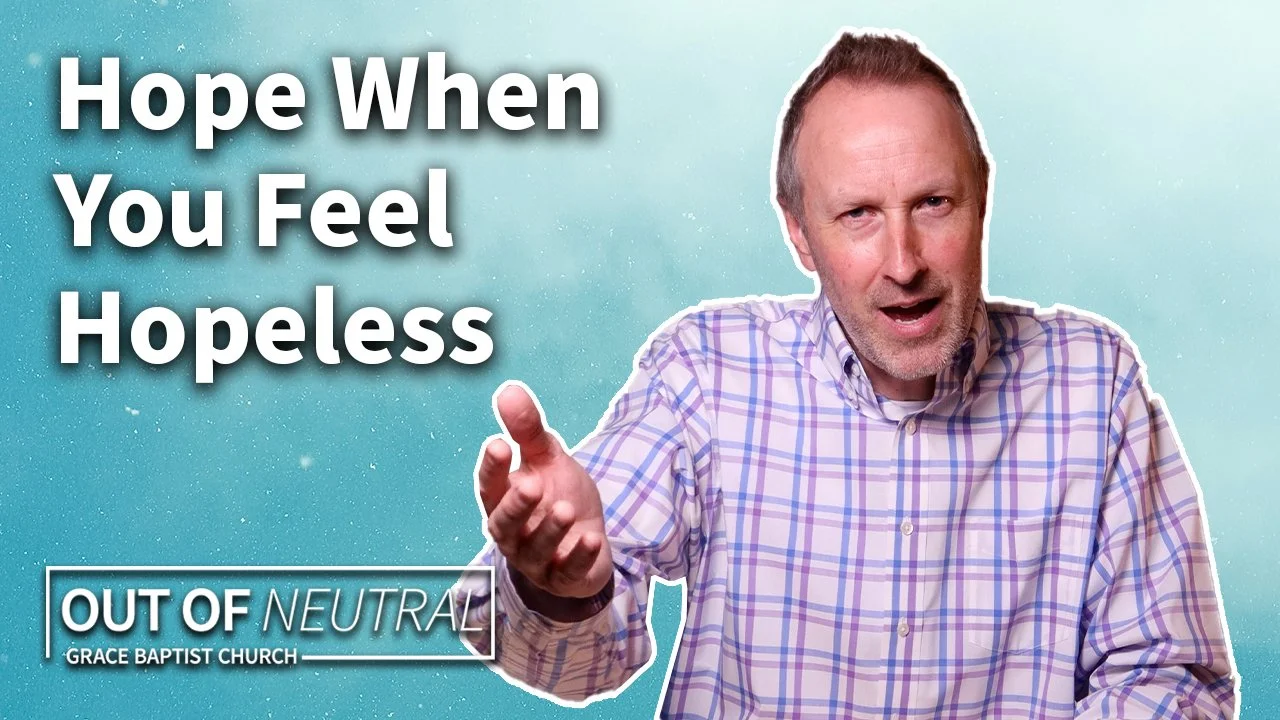Watch
Click on the image above for the video of this article or keep reading below for the text version.
Listen
Read
Feelings of hopelessness usually catch people by surprise. It’s as if we assign those kinds of negative feelings to a certain personality type and we assume that we’re immune. But dark clouds can settle in on anyone’s outlook. The question is what you can do about them.
1. Look back to identify the cause
Experts talk about the importance of identifying where the hopelessness has come from. If you’re feeling hopeless, it’s worth asking when you started feeling less hope. What was the trigger? What were some of the feelings that accompanied it? Feelings are a little like roadside flares. They can point you to a problem but can’t help you fix it.
Most of what causes our hopelessness is found in what the Bible refers to as the Fall. In turning from God and His best for our lives, His perfect creation became a place marked by pain, sickness, and death. The problem is that we long for what we lost. We expect jobs to go smoothly, relationships to be satisfying, and our bodies to be healthy. When they’re not, it’s disorienting.
When you identify where you lost your hope, God invites us to grieve. The psalms are filled with the honest prayers of people expressing their pain (e.g. Psalm 6, 10, 38, 130) to the God who seeks to comfort us. When you look back on what triggered your despair, talk to God about it. Feel the loss but don’t feel it alone.
2. Be as healthy as you can today
The problem with hopelessness is that it snowballs. If a relationship has me feeling pessimistic, it’s not long before I feel it everywhere. I stop caring about food, exercise, sleep, work, friendships, and self-control. When I do that, feelings of hopelessness only multiply.
A relationship with God helps in several ways. First, through the Bible, God keeps calling us to healthy patterns that can give us strength to deal with the discouragement that we feel. Second, when you put your faith in Jesus, God supplies strength from the inside not just teaching from the outside. Third, God puts us in a community of people who are seeking His help to change and grow.
All of this help doesn’t mean that there won’t be times when we need professional help. Clinical depression, for example, needs a clinical response. Therapy is often needed to deal with trauma and chronic issues. But professional therapists will still urge people to seek the healthy patterns that a relationship with God and His people can provide.
3. Find hope for your future
Most people will try to help people who are feeling hopeless to be more positive. That’s important, but how do you do it? If you’re feeling hopeless, it’s usually because you’ve gone through something extremely painful. It’s fine for someone to say that things will get better, but what if they don’t? What if another person lets you down? What if things don’t improve?
The Bible doesn’t teach people to pin their hopes on better circumstances. Instead, it invites us to find our hope in God and eternity. A man named Jeremiah experienced the loss of almost everything he held dear, but his response is captured in these words in Lamentations 3:24: “The Lord is my portion,” says my soul, “therefore I will hope in him.” What he means is that the strength, confidence, peace, and satisfaction he has known in life have come in his relationship with God, and so now in his loss, he will put trust in God and His purposes for him. He will find his confidence not in the fact that things always get better or that the next time this won’t happen, but in a God who loves and sustains him regardless of the circumstances.
While Jeremiah illustrates hope in God, the apostle Paul points us to the hope of eternal life. In Ephesians 1:18, he prays for believers to have “the eyes of your hearts enlightened, that you may know what is the hope to which he has called you, what are the riches of his glorious inheritance in the saints.” You can bear some tough challenges when you know what’s coming at the end of them. Jesus’ death on the cross on our behalf provides an amazing inheritance for all who would put their trust in Him. This is ultimately the basis of lasting hope, but we have to open our eyes to it. By faith, we need to receive it.
If this is new to you and you think it’s something you’d like to explore, I’ve written a free, 12-week course called The Unstuck Life that walks you through the essentials of Jesus’ teachings in daily, bite-sized messages that you can read or watch by video. To learn more, go to www.gracebc.ca/getunstuck.
In awe of Him,
Paul












